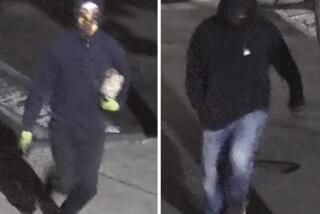Man suspected of plotting to join Al Qaeda is held without bail
- Share via
A Riverside man arrested on suspicion of plotting to join Al Qaeda with three other suspects was ordered Monday to be held without bail until trial.
Magistrate Judge Sheri Pym found that Arifeen Gojali, 21, was too much of a flight risk and danger to the community, based on the allegations by federal investigators.
Gojali was led by federal marshals into U.S. District Court in Riverside on Monday, bound by handcuffs and leg irons and wearing a bright orange, jail-issued uniform. He showed little emotion during the hearing, chatting briefly with his attorney, John Aquilina.
Aquilina told the judge that neither his client nor his family had the financial means to post bail.
FOR THE RECORD:
Al Qaeda suspect: An earlier version of this online article misidentified the name of one of the suspects accused of plotting to join Al Qaeda or the Taliban as Bart Deleon. He is Ralph Deleon.
“If we can’t get over that hurdle, what’s the point?” Aquilina told reporters outside the courtroom after the brief hearing.
Gojali and three other men from the Inland Empire have been accused of plotting to join Al Qaeda or the Taliban in Afghanistan to attack American troops or coalition forces.
Gojali and two other suspects, Bart Deleon of Ontario, 24, and Miguel Santana of Upland, were arrested during a vehicle stop in Chino on Nov. 16, a day after they booked airline tickets from Mexico to Afghanistan.
Deleon and Santana are being held without bail. The alleged ringleader, Sohiel Omar Kabir, 34, was taken into custody the next day. Kabir has lived in Pomona and served a year in the U.S. Air Force.
The native Afghan and naturalized U.S. citizen converted Deleon and Santana to Islam in 2010, then left for Afghanistan, intent on joining the Taliban or Al Qaeda and paving the way for Santana and Deleon to join him, according to authorities.
Santana and Deleon allegedly recruited Gojali in September. Deleon’s attorney, Randolph K. Driggs, last week criticized the federal government’s case for hinging on evidence gathered by a paid confidential informant who had been convicted of drug-related charges.
The informant, who received $250,000 from the FBI and “immigration benefits” for his work over a four-year period, infiltrated the group in March and wore recording devices that provided evidence crucial to the case.
More to Read
Sign up for Essential California
The most important California stories and recommendations in your inbox every morning.
You may occasionally receive promotional content from the Los Angeles Times.












